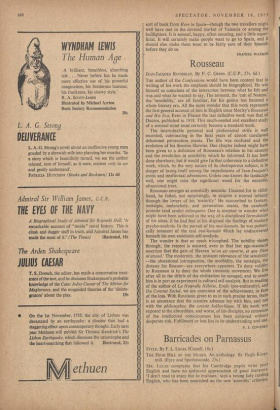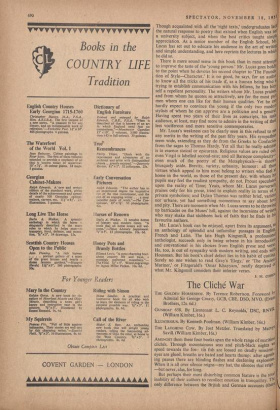Barricades on Parnassus
STYLE. By F. L. Lucas. (Cassell, 18s.)
English and have no unforced appreciation English, who has been nourished on the new 'I don't read to enjoy but to evaluate,' says a MR. Lucas complains that his Cambridge 'scientific' criticism. young lady reading of good literature. pupils write poor
Though acquainted with all the 'right texts,' undergraduates lacy the natural response to poetry that existed when English was nut a university subject, and when the best critics taught simP14 appreciation. As a senior member of the English School, Lucas has set out to educate his audience in the art of writia and simple understanding, and here reprints the lectures in which he did so.
There is more sound sense in this book than in most attempts to improve the taste of the 'young person.' Mr. Lucas goes bola to the point when he devotes his second chapter to 'The Founds' tion of Style-Character.' It is no good, he says, for an audio! to know all the tricks of his trade if, as a human being who° trying to establish communication with his fellows, he has hills' self a repellent personality. The writers whom Mr. Lucas praises' and from whom he quotes so attractively, are for the most part men whom one can like for their human qualities. Yet he can hardly expect to convince the young if the only two modern stylists of whom he can approve are a politician and a general' Having spent two years of their lives as conscripts, his mal,e audience, at least, may find more to admire in the writing of the less vociferous and more sensitive contemporaries. Mr. Lucas's weakness can be clearly seen in this refusal to se° any merits in the writing of the past fifty years. His sympathies seem wide, extending as they do from the Greeks to Confucius' from the sagas to Thomas Hardy. Yet all that he really admirns is in essence stoical or epicurean. Religious values are ruled out' even Virgil is labelled second-rate; and all Baroque complexitr" even much of the poetry of the Metaphysicals-is throoll brusquely aside. Brevity, variety, urbanity, humour : all files° virtues which appeal to him most belong to writers who feel 0,1 home in the world, as those of the present day, with whom his, pupils may feel the readiest sympathy, do not. Proust speculate' upon the reality of Time; Yeats, whom Mr. Lucas perverselY praises only for his prose, tried to explain reality in terms of 13 private symbolism; and Dylan Thomas was neither brief, varions nor urbane, yet had something momentous to say about love and pity. There are moments when Mr. Lucas seems to be throWing up barricades on the Muses' hill, against the incursions of write who may shake that stubborn lack of faith that he finds in ills favourite authors.
Mr. Lucas's book can be enjoyed, apart from its argument,° an anthology of splendid and unfamiliar passages in English French and Latin. The late Hugh Kingsmill, a professiona anthologist, succeeds only in being urbane in his introduction and conventional in his choices from English prose and vel'S`,' He, too, is out of sympathy with modern writing, and ends WO Housman. But his book's chief defect lies in his habit of cutting: Surely no one wishes to read Gray's 'Elegy,' or 'The Ancienle Mariner,' or Fitzgerald's 'Omar Khayyam,' neatly deprived 01 what Mr. Kingsmill considers their inferior verses. M. co110











































































 Previous page
Previous page